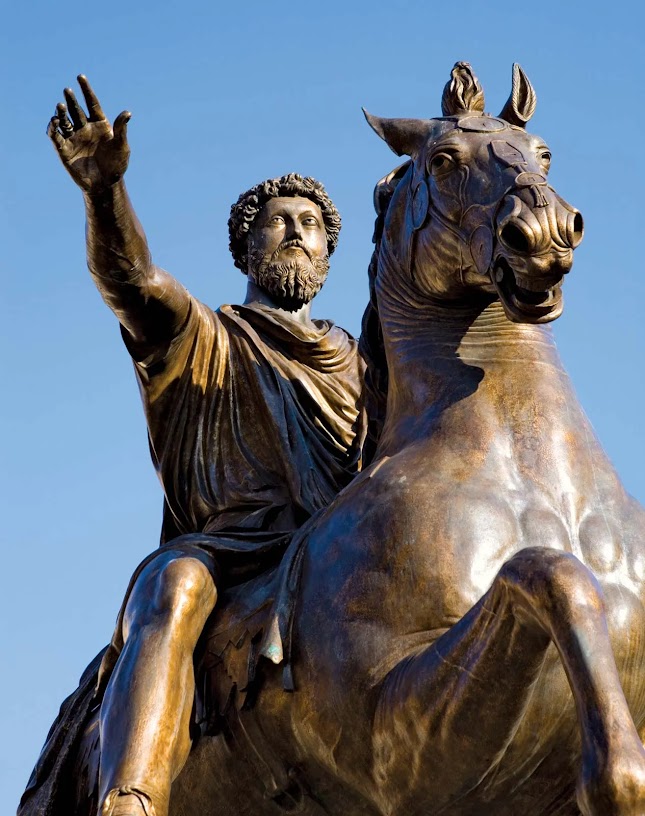Roman Empire Series (Part 3): Sins of our Sons - Marcus & Commodus Aurelius

Marcus Aurelius's paternal grandfather was already consul for the second time and prefect of Rome by the time Marcus was born, which was the crown of prestige in a senatorial career; his father’s sister was married to the man who was destined to become the next emperor and whom he himself would in due time succeed; and his maternal grandmother was heiress to one of the most massive of Roman fortunes. Marcus thus was related to several of the most prominent families of the new Roman establishment, which had consolidated its social and political power.

Growing up, Marcus Aurelius was a dedicated student, learning Latin and Greek. But his greatest intellectual interest was Stoicism, a philosophy that emphasized fate, reason, and self-restraint. He truly attempted to live his philosophy. Aurelius became famous for The Meditations, a collection of his thoughts, Stoic beliefs, and notes on his life.
During the last 14 years of his life, he faced one of the worst plagues in European history. The Antonine Plague, named after him (Marcus Aurelius Antoninus Augustus), was probably caused by a strain of the smallpox virus. The exact cause of Marcus’s illness that led to his death is unknown, it is possible that it was due to the pandemic.
After hearing a rumour about Marcus Aurelius being deathly ill, Avidius Cassius claimed the title of emperor for himself. This forced Marcus Aurelius to travel to the East to regain control. But he did not have to fight Cassius as he was murdered by his own soldiers. In 177CE Marcus proclaimed his 16-year-old son, Commodus, joint emperor. Together they resumed the Danubian wars. Marcus was determined to pass from defence to offense and to an expansionist redrawing of Rome’s northern boundaries. His determination seemed to be winning success when, in 180CE, he died at his military headquarters (Vindobona (Vienna, Austria). Just before his death he had time to commend Commodus to the chief advisers of the regime.

Commodus Aurelius (161CE -192CE)
He is perhaps best known for his obsession with Hercules. He had
his likeness displayed across the empire wearing a lion skin after one of the labors
of Hercules who slew the Nemean lion. In the final year of his reign, 192CE.,
the Senate was forced to declare him a god and proclaim him ''Conqueror of the
World”.
Even as a young child, Commodus displayed a penchant for cruelty that would carry into his rule later. According to a story, the young prince once cast a servant into a furnace for drawing a bath that was too cold. It displayed the love of violence that would compel him to compete as a gladiator in the Colosseum when he went on to rule Rome. When his younger brother died, it was clear that young Commodus would be the next to rule the Empire. Despite violence abroad, Rome flourished under the reign of his father. The Roman people were happy to have the son of an enlightened leader as their new Emperor. Little did they know what was in store.
_01_(cropped).jpg)
In 182CE Commodus’s sister Lucilla conspired with a group of senators to assassinate him. The plot failed, and Commodus retaliated by executing several leading senators. Thereafter his rule became increasingly arbitrary and vicious. In 186 he had his chief minister executed to please the army, 3 years later he allowed the minister’s successor to be killed by a rioting crowd. Political influence then passed to the emperor’s mistress and two advisers. Meanwhile, Commodus was lapsing into insanity.

He gave Rome a new name, Colonia Commodiana (Colony of Commodus), and imagined that he was the god Hercules, entering the arena to fight as a gladiator or to kill lions with bow and arrow. Eventually his madness would lead to a successful assassination attempt.

The emperor was strangled in his bath by Narcissus, tasked by a small group of conspirators including the Praetorian Prefect, Aemilius Laetus. Commodus' chamberlain, Eclectus and Commodus' mistress, Marcia. On 31 December 192CE, Commodus's concubine and conspirator Marcia admitted Narcissus into Commodus's bedchamber. Commodus was supposedly in a drunken stupor after Marcia had poisoned him and Narcissus proceeded to strangle his master in his bathtub or, according to Herodian, in his bed.
Narcissus, the assassin of the Roman Emperor Commodus, was employed by the emperor as a wrestling partner and personal trainer to train Commodus for his self-indulgent appearances in the Colosseum as a gladiator.
This concludes the end of Commodus's life, and also this series on the Roman Empire (Yet, we will most probably revisit this subject in the foreseeable future).
If you are interested in these topics & the history of the ancient Roman Empires, I would recommend the following books:





.png)
Comments
Post a Comment